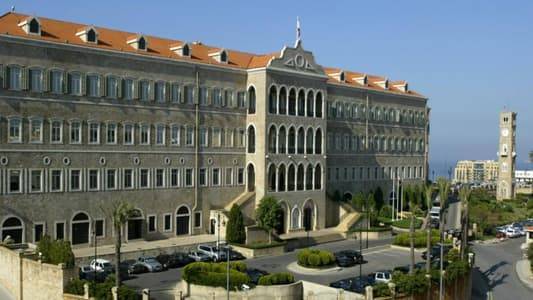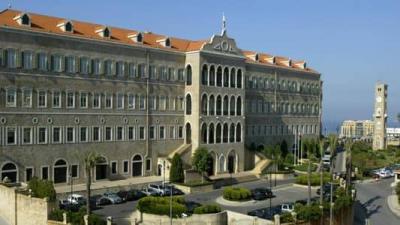Two-thirds of the caretaker government succeeded yesterday in holding its first meeting. This is the first meeting in this capacity since it was considered resigned last May, and the first since the vacancy of the presidency at the beginning of last month. In Lebanese calculations, the first can be the last of the numbers, and it can also be the first among them. Until their first meeting yesterday, Prime Minister Najib Mikati's government had been acting solely as a caretaker government due to its resigned status, without seriously transferring the powers of the presidency to itself in accordance with Article 62, as it refrained from using its powers, emphasizing the reality that it is a caretaker government. However, its first meeting removed the ongoing sense of inadequacy since May, which was that it could not convene, and since November that it could not assume the powers of the presidency. Starting yesterday, the government has become fully operational; it can meet at any time and make necessary decisions. However, its primary condition is its political quorum, which takes precedence over its constitutional quorum.
The first fruit of the successful first meeting is that it opens the door for the experience to be generalized to the parliament, allowing the general assembly to reconvene for legislation at any time. The parliament does not need a specific session to require its meeting for three obvious intertwined reasons: firstly, it is in the heart of the second ordinary session; secondly, it is in permanent session due to the resignation of the government until a new government is formed; and thirdly, it is in continuous session to elect a president. The third factor is covered by Article 75, which confines any session convened by the parliament to the presidential election without granting it the right to legislate. Before and after that, it has the right to legislate. Thus, it is not the constitutional text preventing the parliament from holding its meetings but rather the surrounding problem, for which President Najib Mikati has found a solution on his turf by providing a two-thirds quorum of his ministers for the meeting to convene.
Speaker Nabih Berri's task is less difficult. He needs a simple majority to convene the parliament. Such a quorum is not necessarily impossible. However, the surprising last-minute development of yesterday's cabinet meeting, following the statement from nine ministers announcing their reluctance to participate, and then the retraction of two of them, namely the ministers of social affairs and industry, indicates several observations:
Firstly, while the election of a president is crucial and is the constitutional entitlement that supersedes all else and requires prompt action, the meetings of the cabinet and parliament cannot wait for the president's election to occur. Because there is no vacuum in the high constitutional authorities that necessitates the conduct of affairs by the current cabinet, the meeting of the executive and legislative branches becomes mandatory. The actual incentive for the meeting and not waiting for what is not coming soon is the precedent established in 1988, which lasted for 14 months, and was tested again in 2007 for six months, and reached its peak in 2014 for two and a half years — until yesterday at least — with the postponement of the presidential election, making this precedent a common event expected whenever the time approaches.
Moreover, no one can predict the duration of the presidential vacancy, not to mention the lack of urgency from influential and powerful figures to reach the election of a successor to President Michel Aoun. It is not only the constitutional rules that necessitate — if not compel — the meeting of the two semi-paralyzed branches of power, but also the deteriorating realities of daily life for the Lebanese.
Secondly, if it were not for the financial obligations of hospitals to provide medication for chronic diseases and kidney treatments, perhaps the cabinet meeting would not have taken place yesterday. Regardless of who was pleased or frowning, the convening of the cabinet is not a definitive metric for what may result in the coming phase, and it is uncertain that it can be easily held again like the first session, despite its importance and necessity. The reality is that the convening of the session, even if it concluded in a first round with winners and losers, is not the end of the matter. It became clear the evening of and the day after that Mikati and MP Gibran Bassil exchanged more than just pulse checks. They were as close as sparring partners. The cabinet convened with a mere two-vote margin leaning towards the Free Patriotic Movement. This indicated that the contest is not yet over.
Bassil revealed that he still holds, singularly, the largest share in Mikati's government, even after the end of his uncle's presidential term, as if his angels are still present. This also indicated what was implied in the stalled negotiations for the formation of the government between May and October, namely that the head of the Free Patriotic Movement was the biggest winner, whether in moving towards a new obstructive third in the new government or returning to the current obstructive third he possesses in the caretaker government.
Thirdly, while Bassil holds more than a third in the current government, the five other groups combined — Berri, Mikati, Hezbollah, Walid Jumblatt, and Sleiman Frangieh — hold less than two-thirds. Among those absent is the minister of displaced persons, an ally of Hezbollah, just as among those present is a close ally as the deputy prime minister. Consequently, the agenda, particularly the item concerning hospitals, is more about calling for the session rather than political muscles. However, the most important thing that the head of the Free Patriotic Movement sought, which might be one of his weapons in the coming phase, is that no new cabinet session is held without discussing or reaching a minimum understanding with him, and at the very least, requiring the signature of the ministers in his share.
The reality is that Hezbollah is not far from this calculation at all. No one in the resigned government or outside of it is under the illusion, in light of the convening of the session on Monday, that Hezbollah has abandoned its Christian ally, neglected him, or sought to avenge him. Not in the calculations of any faction, whether for or against Bassil — and the latter are the majority — does it appear that he has lost the battle against Mikati that began with the resignation of the 2022 election government.
Fourthly, Hezbollah justified yesterday's session as merely an exception, claiming that there were health and social justifications for it. However, it is more widely understood that the party, at this particular time and more than ever, needs its Christian ally as it approaches the presidential election and wants to enter with a candidate, Frangieh, whom it considers the head of the largest parliamentary bloc and the most powerful Christian bloc against its fiercest personal and political rivals, while Bassil doubles down on his exaggerated refusal to support him. Despite this distance, neither party turned its back on the other or resented it. The constitutional entitlement at stake takes precedence in the attention of the Shiite and Christian allies, as they engage in one of the toughest political battles in light of a vague future for the country and a destiny that becomes increasingly bleak and pessimistic.




